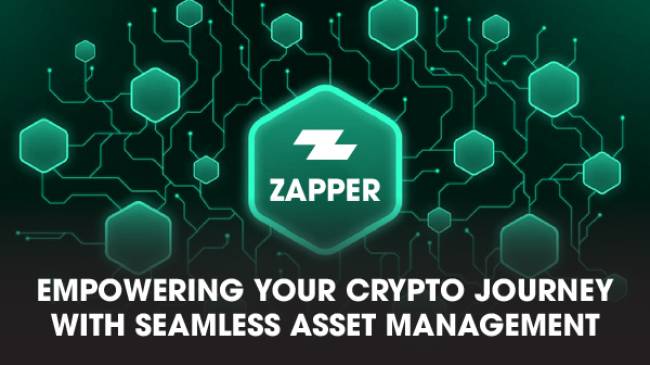Curious about what is Zapper and how it can revolutionize your digital asset management experience? Look no further. In this blog, we'll unravel the mysteries of Zapper, an innovative platform that simplifies the management of your crypto portfolio and enhances your NFT transactions. With its powerful features and user-friendly interface, Zapper empowers crypto enthusiasts and collectors to effortlessly track, optimize, and acquire digital assets.
Table of Contents
What is Zapper?
What is Zapper? Zapper is a groundbreaking digital asset management platform that has gained significant popularity within the cryptocurrency and non-fungible token (NFT) communities. It serves as a comprehensive solution, allowing users to easily track, manage, and engage with their decentralized finance (DeFi) investments and NFT collections. With its intuitive interface and powerful capabilities, Zapper has become an essential tool for crypto enthusiasts and collectors alike.

How does Zapper work?
Zapper is a DeFi (Decentralized Finance) management platform that provides users with a convenient way to interact with various DeFi protocols, manage their assets, and track their holdings across multiple blockchain networks. Here's a general overview of how Zapper works:
-
Connect Wallet: To get started with Zapper, users need to connect their cryptocurrency wallet to the platform. Zapper supports a range of wallets, including MetaMask, Trust Wallet, Ledger, and others. Once connected, Zapper can access information about the user's holdings and transactions.
-
Portfolio Tracking: Zapper provides a consolidated view of a user's DeFi portfolio. It displays the various tokens held in the connected wallet and provides real-time pricing information, allowing users to see the total value of their assets.
-
Asset Management: Users can perform various actions directly from the Zapper interface. These actions may include:
-
Swapping Tokens: Zapper may allow users to swap one cryptocurrency for another through integrated decentralized exchanges (DEXs).
-
Providing Liquidity: Users can provide liquidity to liquidity pools on DEXs, such as Uniswap or SushiSwap, and earn rewards in the form of fees and governance tokens.
-
Yield Farming: Zapper often provides access to yield farming opportunities, allowing users to stake their assets in liquidity pools or DeFi protocols to earn additional tokens or interest.
-
Investing in Protocols: Users can invest in various DeFi protocols and projects directly from the platform. This includes participating in lending, borrowing, or other DeFi activities.
-
-
Cross-Chain Support: Zapper typically supports multiple blockchain networks. Users can manage assets and interact with DeFi protocols on different chains, such as Ethereum, Binance Smart Chain, and more, all from one platform.
-
Delegated Management: Some versions of Zapper allow users to delegate their assets to trusted managers or yield aggregators who can optimize their DeFi investments on their behalf.
-
Gas Optimization: Zapper may offer tools to help users optimize gas fees when conducting transactions on blockchain networks, potentially reducing transaction costs.
-
Tax Reporting: Zapper often includes features for tracking and reporting cryptocurrency transactions for tax purposes, simplifying the process of tax compliance for users.
It's important to note that the specific features and capabilities of Zapper may evolve over time, and there may be variations in how it works depending on the version or platform updates. Users should always refer to the official Zapper website or documentation for the most up-to-date information and instructions on how to use the platform effectively and securely.
Additionally, users should exercise caution and perform due diligence when interacting with DeFi platforms and protocols, as they can involve risks, including smart contract vulnerabilities and market volatility.
The Versatility of Zapper
Zapper offers a range of advantages that make it an indispensable asset management tool for cryptocurrency enthusiasts. Firstly, it enables users to consolidate all their DeFi holdings and NFTs into a single dashboard, providing a holistic view of their assets. This eliminates the need to switch between multiple platforms and wallets, saving precious time and effort.
Additionally, Zapper provides real-time portfolio analytics, empowering users to evaluate the performance of their investments, monitor liquidity, and identify potential yield farming opportunities. Through detailed insights and visualizations, Zapper equips users with the information needed to make informed decisions and optimize their strategies within the ever-evolving crypto landscape.
Moreover, Zapper simplifies participation in DeFi protocols by seamlessly integrating with popular decentralized exchanges and liquidity pools. Users can effortlessly swap tokens, provide liquidity, and earn yields directly through the platform. With its integration across various DeFi protocols, Zapper ensures a seamless and efficient user experience, enabling users to leverage the full potential of the DeFi ecosystem.

What are the advantages and disadvantages of Zapper?
Zapper is a DeFi (Decentralized Finance) management platform that offers several advantages and disadvantages, depending on the needs and preferences of users. Here's an overview of some potential advantages and disadvantages of using Zapper:
Advantages:
-
Convenience: Zapper provides a user-friendly interface that allows users to interact with multiple DeFi protocols and manage their assets from a single dashboard. It simplifies the process of navigating the complex DeFi ecosystem.
-
Portfolio Tracking: Users can easily track their DeFi portfolios and monitor the performance of their assets. Zapper provides real-time pricing information, making it convenient for users to assess their holdings.
-
Asset Management: Zapper offers a range of DeFi-related actions, including token swaps, providing liquidity to pools, yield farming, and investing in various DeFi projects. This streamlines asset management for DeFi users.
-
Cross-Chain Support: Zapper typically supports multiple blockchain networks, allowing users to manage assets across different chains from a single platform. This enhances flexibility and accessibility.
-
Gas Optimization: The platform may include features to help users optimize gas fees when conducting transactions on blockchain networks, potentially reducing transaction costs.
-
Tax Reporting: Zapper often provides tools for tracking and reporting cryptocurrency transactions for tax purposes, simplifying tax compliance for users.
Disadvantages:
-
Security Risks: While Zapper itself aims to be secure, using DeFi platforms inherently involves risks, such as smart contract vulnerabilities, hacks, and the potential loss of assets. Users must exercise caution and understand these risks.
-
Dependence on Third-Party Services: Zapper relies on external DeFi protocols and services. Any issues or downtime with these protocols could affect the functionality of Zapper.
-
Complexity: DeFi can be complex, and while Zapper aims to simplify the experience, it may still require users to have a basic understanding of DeFi concepts and operations to use it effectively.
-
Limited Control: When users delegate their assets to yield aggregators or managers through Zapper, they are giving up some control over their funds. Trust in the chosen manager is crucial.
-
Market Volatility: Cryptocurrencies and DeFi assets are subject to price volatility, which can affect the value of a user's portfolio.
-
Regulatory Uncertainty: The regulatory environment for DeFi and cryptocurrency platforms is evolving. Users should be aware of potential regulatory changes that could impact their use of such platforms.
-
User Support: The availability of customer support and assistance may vary depending on the platform and its resources. Users should be prepared to seek help through official channels if needed.
It's important to note that the advantages and disadvantages of using Zapper or any DeFi platform can change over time due to updates and developments in the space. Users should stay informed about the latest features, security practices, and potential risks associated with the platform by referring to official sources and conducting thorough research before using it. Additionally, users should only invest what they can afford to lose and exercise caution in the rapidly evolving DeFi landscape.
Utilizing Zapper Effectively
Using Zapper is a user-friendly and straightforward process. Here is a step-by-step guide to help you get started:
Accessing the Zapper website: Visit the official Zapper website (insert website URL) and connect your Ethereum wallet. Zapper supports well-known wallets such as MetaMask, Coinbase Wallet, and WalletConnect.
Connecting your wallet: Click the "Connect Wallet" button and choose your preferred wallet provider. Follow the prompts to securely connect your wallet.
Exploring your portfolio: Once connected, Zapper will display an overview of your portfolio, including token balances, NFTs, and various DeFi positions. Take some time to familiarize yourself with the different sections and features.
Tracking your assets: Zapper automatically retrieves and updates your asset balances, allowing you to monitor the value of your holdings in real-time. Customize your portfolio view based on your preferences.
Swapping tokens and providing liquidity: Utilize Zapper's integrated DEX aggregator to swap tokens directly within the platform. You can also provide liquidity to various pools by selecting the desired token pair and following the on-screen instructions.

Acquiring NFTs through Zapper - Step-by-Step Guide
Accessing the NFT section: Within Zapper, navigate to the NFT section, where you can view and manage your NFT collection.
Connecting your NFT wallet: Connect your preferred NFT wallet, such as MetaMask, to Zapper. This enables Zapper to retrieve and display your NFTs.
Browsing and selecting NFTs: Explore the available NFTs on Zapper or import your existing NFTs into the platform. Zapper supports popular NFT marketplaces like OpenSea and Rarible.
Purchasing or trading NFTs: Once you've chosen the desired NFT, proceed to purchase or trade it directly through Zapper. Follow the prompts and confirm the transaction on your connected wallet.
Managing your NFT collection: Zapper allows you to efficiently organize and track your NFT collection. Access detailed information about each NFT, monitor their value, and even list them for sale on supported marketplaces.
Conclusion
To conclude, what is Zapper? Zapper is a groundbreaking platform that simplifies digital asset management and enhances the NFT experience. Through comprehensive portfolio tracking, seamless integration with DeFi protocols, and user-friendly NFT management tools, Zapper empowers users to navigate the complex world of cryptocurrencies and digital collectibles with ease. Embrace the power of Zapper today to unlock new possibilities in decentralized finance and NFTs. Follow U2U for more blockchain updates.






